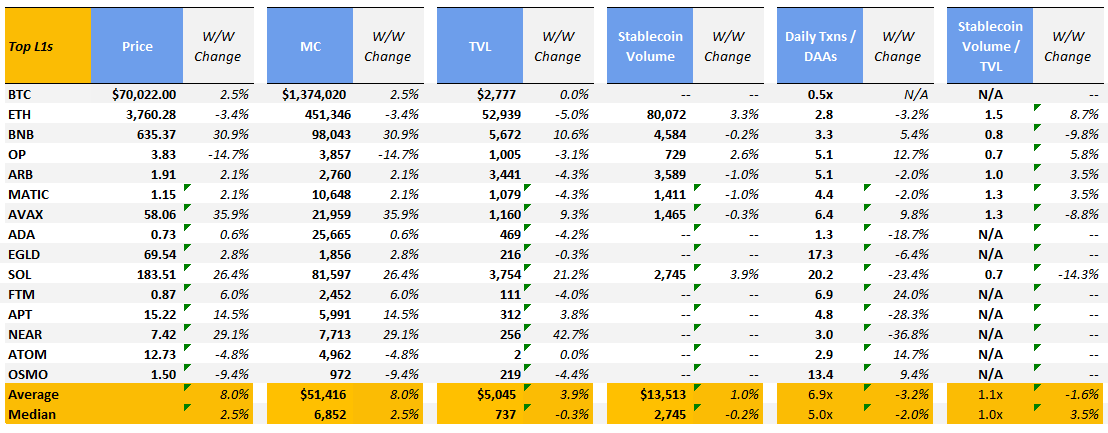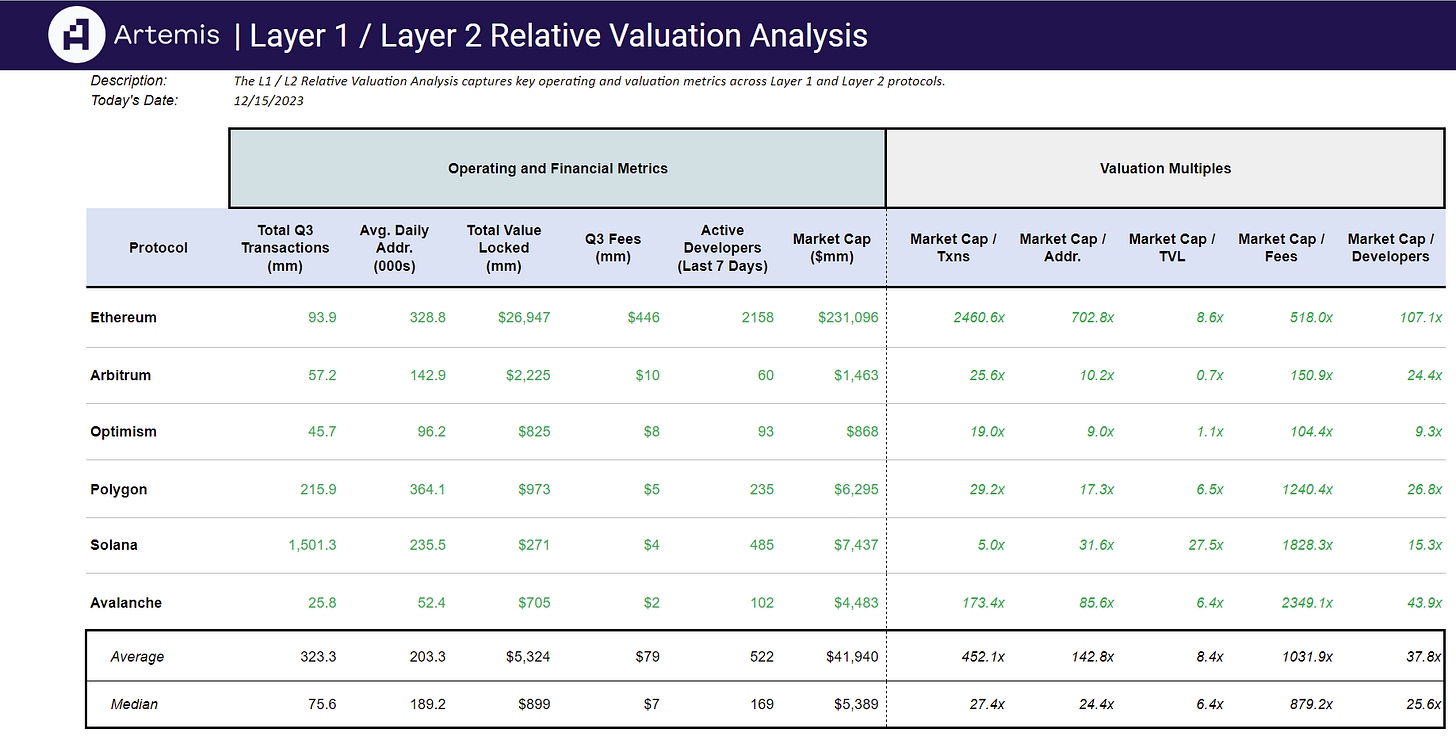This week, MicroStrategy plans to buy another $500m of BTC, Hong Kong Monetary Authority enters Phase 2 of its CBDC testing, and Memecoin dogwifhat might go on Vegas Sphere.
🌞 Ethereum Upgrade ‘Dencun’ Goes Live, Reducing Data Costs for Layer 2 Roll-ups
💫Jito Shuts Down MEV on Solana
The week saw heavy divergence across major tokens as average and median WoW prices increased by 8.0% and 2.5%, respectively. Spot Bitcoin ETF inflows declined over the week with March 14th marking one of the lowest net inflow days since launch with $132mm of net inflows. Thursday March 14th was the second consecutive day of inflow decline and an 80% decline vs. net inflows on Wednesday March 13th of ~$684mm. Tuesday March 12th saw a record single-day net inflow of $1.05bn. This week saw alt L1s including BNB, AVAX SOL and NEAR see massive outperformance vs. its peers with mid double digit WoW gains.
Meanwhile, the S&P 500 increased by 0.1% while the Nasdaq Index declined by 0.5% WoW, as CPI inflation came in higher than expected for the month of February. Investors are now looking to how recent inflation data will impact the Fed’s next policy meeting which will start on March 19th.
🌞 Ethereum Upgrade ‘Dencun’ Goes Live, Reducing Data Costs for Layer 2 Roll-ups
On Wednesday March 13th Ethereum’s ‘Dencun’ upgrade, the largest upgrade since the Merge, went live. While this software upgrade introduced several changes, the key upgrade was the introduction of blob-carrying transactions that aim to reduce fees for Ethereum rollups. The ‘Dencun’ upgrade implements changes proposed in EIP-4844: Shard Blob Transactions. Often referred to as proto-danksharding, EIP-4844 is part of Ethereum’s rollup-centric scaling roadmap which assumes that consumer-facing applications will be built on rollups that leverage Ethereum for security and settlement. There is already a large and growing ecosystem of rollups like Arbitrum, Base and Optimism.
Prior to Dencun, while transaction costs on roll-ups were cheaper than interacting directly with the Ethereum L1, they were still quite expensive compared to other blockchains such as Solana and Cosmos ecosystem chains. Transaction fee analysis by @Marcov on Dune shows that prior to the upgrade, median transaction costs were ~0.30-0.40 USD, while fell to to ~0.01 USD after the upgrade. This indicates that median USD fees went down between 78-99% on rollups that have already implemented blobs (important to note that individual rollups have to adopt and implement the changes in order to take advantage of the upgrade).
This led some Ethereum supporters to jump to the conclusion that Ethereum had won the ‘scaling wars’ as a result of the upgrade. The ‘scaling wars’ refer to the competition between different blockchain ecosystems and protocols to bring consumer-scale applications capable of handling mass adoption.
Skeptics pushed back saying that it is too early to tell, and that it is very likely that transaction costs on L2s will actually increase from where they are now as more rollups implement blobs and there is more competition for the limited blob space. For reference, Ethereum is currently targeting 3 blobs per block with a maximum of 6 blobs per block.
Another interesting bit of on-chain data comes from an analysis of blobs by @Hilldobby on Dune. Hilldobby’s analysis indicated that Starknet was posting about 90% of all blobs at one point. Since then, as more rollups have started posting blobs, Starknet’s share of blobspace has declined.
It will be interesting to see what happens over the coming weeks as the ecosystem adapts to the changes, and more L2s start using blobs. There is also another great change coming to the scalability arena in the form of Solana’s new Firedancer client which aims to make the network the more performant in preparation for mass adoption. At the same time, Avalanche is rolling out its HyperSDK to help launch ultra fast subnets. 2024 is already poised to be a very exciting year for blockchain scalability and adoption!
💫Jito Shuts Down MEV on Solana
What is MEV?
MEV, short for Maximal Extractable Value, refers to the maximum value that can be extracted from block production beyond standard block rewards and gas fees. Before transactions are finalized via inclusion in a block they wait in a place known as the mempool for all to see. Typically, MEV searchers, entities looking for value extraction opportunities, will scan the mempool for transactions that they can take advantage of. An example is a standard DEX swap which will affect the price of the assets in the pool. MEV searchers can identify transactions like these before they are executed and exploit them by injecting a transaction before and after the swap to profit on the price move in a nearly risk-free way.
The issue with MEV
If you tried to get in on the Solana memecoin action last week by swapping directly on-chain you may have had trouble doing so. Many users have been experiencing difficulties using Solana DEXs recently, with transactions frequently failing to go through. Anecdotally, the solution was to increase your slippage tolerance, and get a worse execution price on your swap. Slippage refers to the difference between the price you are quoted when you send a transaction, and the price the trade actually gets executed at. On most DEXs users can set a maximum amount of slippage that they will accept in order for their transaction to go through. However, with traders trading against shallow liquidity memecoin pools, transactions were seeing much larger impacts on price than is typical, indicating high slippage. To make matters worse, Solana MEV bots aiming to sandwich attack users trades were moving price so significantly that it was nearly impossible to execute a transaction within reasonable slippage ranges.
The solution?
Solana MEV is different from other chains like Ethereum in that it does not have a native mempool. Jito Labs is a company that develops Solana MEV infrastructure. They are the primary provider of MEV infrastructure on Solana, offering a third-party mempool where MEV can be harvested. At its peak at the end of last week (3/8), Jito was generating 10,000 SOL in tips, at an annualized rate of ~$500m. This balance reflects how much people were willing to pay to have their transactions that were being impacted by MEV included in new blocks.
To the surprise of the broader crypto community, the Jito team decided suspend the mempool offered through their Jito Block Engine product, in a demonstration of their dedication to the long-term success of the Solana network. The team noted that Solana has always been a consumer-friendly chain that was easy to onboard onto, and that the negative externalities caused by MEV were damaging to users in a way not seen before at such scale. The question remain whether or not this will resolve the problem long term. Some community members believe another team will come along and build a copycat product, potentially introducing the same problem back into the ecosystem. Others praised Jito for the valiant move as they are forgoing revenue in favor of the long term health of the community. Meanwhile, Solana network fees and revenue have continued to rise above all time highs.
Detailed dashboard for people who love more numbers in smaller font:
Note: Revenue represents fees that go to the protocol’s treasury or are returned to tokenholders via a burn mechanism. Weekly commits and weekly dev activity as of 2/24/24.
The content is for informational purposes. None of the content is meant to be investment advice. Use your own discretion and independent decision regarding investments.
Artemis Sheets
Check out other analyses such as the Artemis Relative Valuation L1 / L2 Analysis in Google Sheets here! Track valuation multiples across key operating metrics for top blockchain including Ethereum, Arbitrum, Optimism and Solana.
Powered by Artemis Sheets 🌞
















